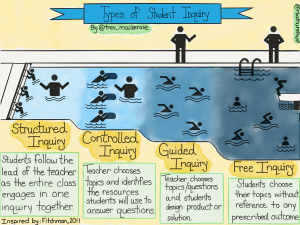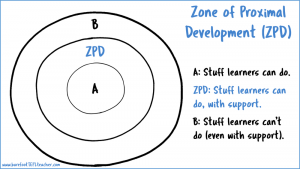The two readings that were provided for EDCI 568 this Wednesday seemed to be in direct contrast with each other. See my notes below for more information from each article.
Why Minimal Guidance During Instruction Does Not Work: An Analysis of the Failure of Constructivist, Discovery, Problem-Based, Experiential, and Inquiry-Based Teaching by Paul A. Kirschner, John Sweller & Richard E. Clark (2010)
-
- The goal of this article is to suggest that based on our current knowledge of human cognitive architecture, minimally guided instruction is likely to be ineffective.
- Important to consider for this argument: working, long term memory, and the cognitive process
- Long term memory – central and dominant structure of human cognition (everything that we see, touch, and hear is influenced by our long term memory)
- Expert problem solvers derive their skill by drawing on the extensive experience stored in their long-term memory and then quickly select and apply the best procedures for solving problems
- If nothing has been changed in long term memory, then nothing has been learned
- Minimal guidance during instruction doesn’t allow learners to develop clear and precise pathways of learning to store in long term memory (stays in short term memory and is quickly lost)
- How to learn needs to be scaffolded (when left to their own devices, higher risk for low aqcuisition of information and development of misconceptions)
Teaching for Meaningful Learning by Dr. Barron & Darling-Hammond, StanfordU
-
- The importance of inquiry based teaching and learning in order for students to develop ‘21st century skills’ (inquiry, problem based, learning by design)
- Types of assessment (ex. rubric) vs. the feedback that it gives (levels of progress)
- Students learn more deeply when they can apply classroom-gathered knowledge to real-world problems, and when they take part in projects that require sustained engagement and collaboration.
- Active learning practices have a more significant impact on student performance than any other variable, including student background and prior achievement.
- Students are most successful when they are taught how to learn as well as what to learn.
- These ‘new’ learning experiences require simultaneous changes in curriculum, instruction, and assessment practices
Class Discussion and Questions to Consider
As mentioned by Barron and Hammond,
“decades of research illustrate the benefits of inquiry-based and cooperative learning to help students develop the knowledge and skills necessary to be successful in a rapidly changing world.”
Personally, my views on students supports sits somewhere in the middle. I believe that the Inquiry approach to teaching is the most effective way for students to develop an understanding of themselves and the world around them. Throughout my school year, I move through the ‘pool’ as Trevor Mackenzie notes in his book, Dive into Inquiry. At the beginning of the year, the whole class is engaging in the same inquiry together as we develop our questioning strategies, nonfiction reading skills, research skills, and persistence. Throughout the rest of the year, I often transition from controlled inquiry into guided inquiry. There have been very few instances where I have been able to fully let go in my grade 2/3 classroom. However, I am hoping to make this more of a focus as I transition into an intermediate classroom next year.
I believe that in order to build students success, educators needs to scaffold the learning experiences in order for students to develop the skills in order to be an independent learner. Reference the Zone of Proximal Development below.
The transition in education from traditional teaching strategies to Inquiry and Problem Based Learning experiences (PBL) was exciting and quick. However, I think it was done without much thought of students current education experiences as well as developmental abilities. As mentioned in our class discussion, high school students especially, are struggling with open ended teaching and learning.
Are students just lazy?
No. I believe that students are products of what they have been surrounded with. I think that in elementary school, educators are lucky because we have such a great opportunity to take advantage of our young students inherent curious nature to explore the world around them. Therefore, we should be using this time to scaffolding students learning process in order to transition into more difficult problems and concepts in the higher grades. It is unfair for educators to teach young students in the traditional way and then be expected to learn for themselves in a secondary setting. We need to provide students with the skills and strategies for success.
“Although unguided or minimally guided instructional approaches are very popular and intuitively appealing, the point is made that these approaches ignore both the structures that constitute human cognitive architecture and evidence from empirical studies over the past half-century that consistently indicate that minimally guided instruction is less effective and less efficient than instructional approaches that place a strong emphasis on guidance of the student learning process” (Kirshner, Sweller, & Clark, 2010).
If students are only wanting to do the minimum of what is expected, I think that is sign to us educators that they have not yet developed the appropriate neural pathways, they are used to low expectations of others, or they are not engaged with the learning that is happening.
How can students show their learning in different ways if they have not been taught it?
I believe that this is my job as an elementary school teacher – to expose students to exploring and experimenting with a variety of different ways to learn and share their learning with others. Therefore, as students get older, they can experiment with different ways to show their learning because they already know how to do the ground work.
Do grades feed into this?
As mentioned in the video above, the focus on grades for students pits kids against each other which creates a competitive environment instead of a collaborative one. I think the hyper-focus on grades, especially in the upper grades, gives students a way to compare themselves and develop a sense of self-identity that rides solely on their perceived abilities which is extremely detrimental as they get older.
In B.C. we are lucky to have a new sense of flexibility that comes along with the redesigned curriculum. The curriculum focuses more on the development of core and curricular competencies as life skills instead of the regurgitation of content. Because of the focus on skills and competencies, there is a need for a ‘continuum for growth and development’ as our School District calls it. So we are transitioning from a focus on grades and percentages to growth and development of a particular skill. We are definitely moving in the right direction, but it is going to take a while for students, but particularly, parents to be on board with this approach.
Transition from high school to higher education using an open model?
Parents continued focus on grades, I believe, is two-fold. They are used to the way things were when they were going to school (local, nationally, or internationally) and they are concerned about how the indicators on the growth continuum will translate into acceptance into a post secondary institution.
The first issue I think will just take patience and time. As educators continue on this journey of focusing on the competencies and clearly communicating the importance and the benefits of doing so, I think parents will come around.
In regards to the second issue, that is a systems concern. But some Post Secondary institutions are following the elementary and secondary school approach and altering their admission qualifications (see SFU’s here).
Something else to add – During a discussion with a secondary principal at the UBC Short Course this weekend, he had mentioned this his School District in Prince George have started to change the language between elementary and secondary schools to align the approaches in the new curriculum to the types of learning that is going on at each site and each grade. He believes that the language of elementary, secondary, and post-secondary is not inclusive. Therefore, his district has moved to using the word foundational studies (Grades K-10) and graduate studies (Grades 11+). I thought this was a very interesting approach and something I would like to consider for my own site.


Recent Comments